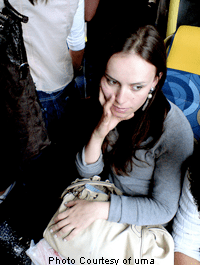 By Rabbi Yitzchok Adlerstein
By Rabbi Yitzchok Adlerstein
Sammy Davis Jr., one of the infamous Rat Pack celebrities, told of the time he got into a bus in the Deep South of the ‘60s. The driver turned to him and scowled, "Hey, N_____! Get to the back of the bus!" Davis, a recent convert to Judaism, protested. "But I'm Jewish!" The driver was not fazed. "In that case, get off the bus!"
In the great debate between pro-choice and pro-life positions, Jewish law finds itself off the bus. Within the details of the traditional Jewish law treatment of abortion, advocates of either of those approaches will find something to hate.
Jewish law certainly objects to abortion on demand. The Talmud (the most important source-text for Jewish law) includes a code of conduct for non-Jews, quite apart from the myriad details of the far more complex legal demanded of practicing Jews. The Noahide Code fleshes out the expectations that G-d has for all of humanity. Its seven laws includes, as would be expected, a prohibition against murder. Included in this prohibition, according to the Talmud, is destroying a fetus.
Does that mean that abortion is equivalent to murder? Not necessarily. Most decisors argue that therapeutic abortion -- terminating the fetus to save the life of the mother -- is permissible. If a fetus would be legally seen as fully human, it could not be sacrificed to prevent harm to any other human.
The plot thickens when we get to the more elaborate treatment of the subject regarding the nuances of the more elaborate treatment of the law for Jews. Several sources in the Talmud make it clear that a fetus is not legally seen as endowed with full personhood until the very moment that it (or at least its head) is delivered. On the other hand, the fetus is not seen merely as a lump of tissue that its mother can regard as a part of her body and nothing more. Thus, Talmudic sources assert that abortion is not treated as severely as homicide, and that the life of the mother trumps that of her unborn fetus. At the same time, the fetus has legal standing. Generally, it takes a threat to life to override the laws of the Sabbath. Yet, a Talmudic source makes it clear that one can violate the Sabbath to save the life of a fetus. Somehow, Jewish law sees the fetus as intermediate between a full human being and a legal non-entity.
The source of the prohibition against non-warranted abortion in the Noahide Code is straightforward. Curiously, the source for the prohibition to Jews is more circuitous. Decisors for hundreds of years have agreed that abortion is prohibited, but have disagreed about that source -- and therefore disagreed about the severity of the prohibition, and possible mitigating circumstances that would allow it. One view regards it as on a continuum with murder. Feticide may not amount to the full-blown offense of murder, but it must still be treated quite strictly. According to this view, only the threat to the life of the mother will permit abortion. (Even according to this view, the possibility of an extreme psychological reaction brought on by the pregnancy can sometimes be treated as life threatening.)
Other views find different conceptual frameworks for locating a prohibition against abortion. One of these, for example, is the prohibition against self-mutilation. According to these alternative conceptualizations, a greater number of circumstances will permit abortion, since the nature of the prohibition is not as weighty. Thus, some major thinkers permit abortion in cases of rape and incest, or to protect the mental well-being of the mother, even when there is not possible threat to life. Some in the more lenient school allow abortion when there is no long-term viability for the fetus, as in the case of a prenatal diagnosis of Tay-Sachs, a Jewish genetic disease that invariably claims the life of the child within a few years.
No authorities, however, allow abortion as a convenience, as a form of delayed contraception, or because of economic hardship.
When does the fetus attain its special status? This, too, is debated. In a different area of Jewish law, a fetus prior to 40 days after conception has no significance. Some important scholars carry this over to the arena of abortion. At times of great need (including advising a quick D&C for a rape victim), they will be more lenient before a fetus reaches the 40-day benchmark. Interestingly, this has not prevented important contemporary decisors from ruling leniently in the opposing direction. With the great strides in fetal surgical intervention, some have ruled that if such surgery were indicated for a young fetus even prior to is 40th day, the Sabbath could be violated to save it. (These same decisors do have a lower limit. They do not sanction violating the Sabbath for a fertilized ovum that awaits implantation in a host mother.)




